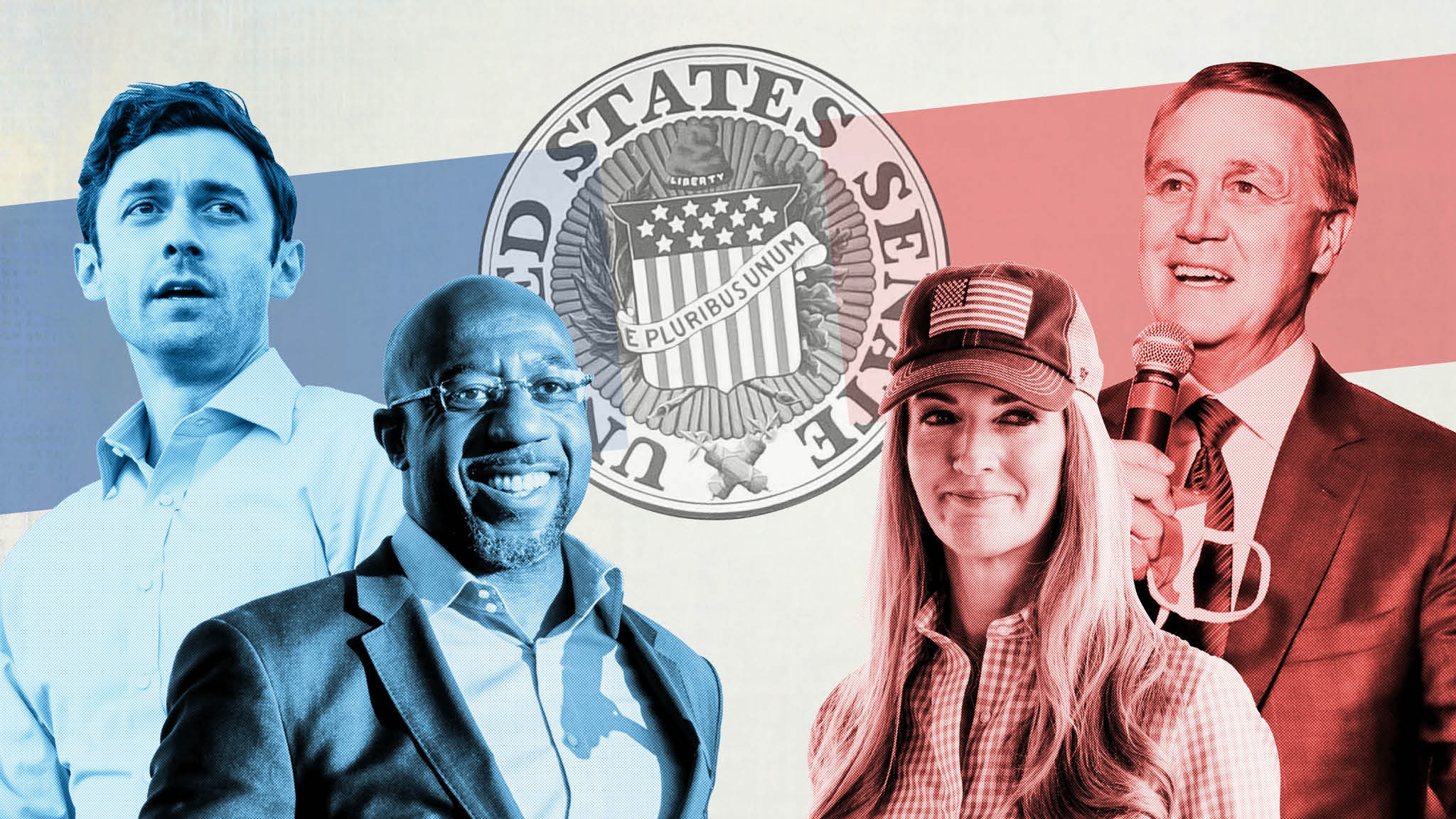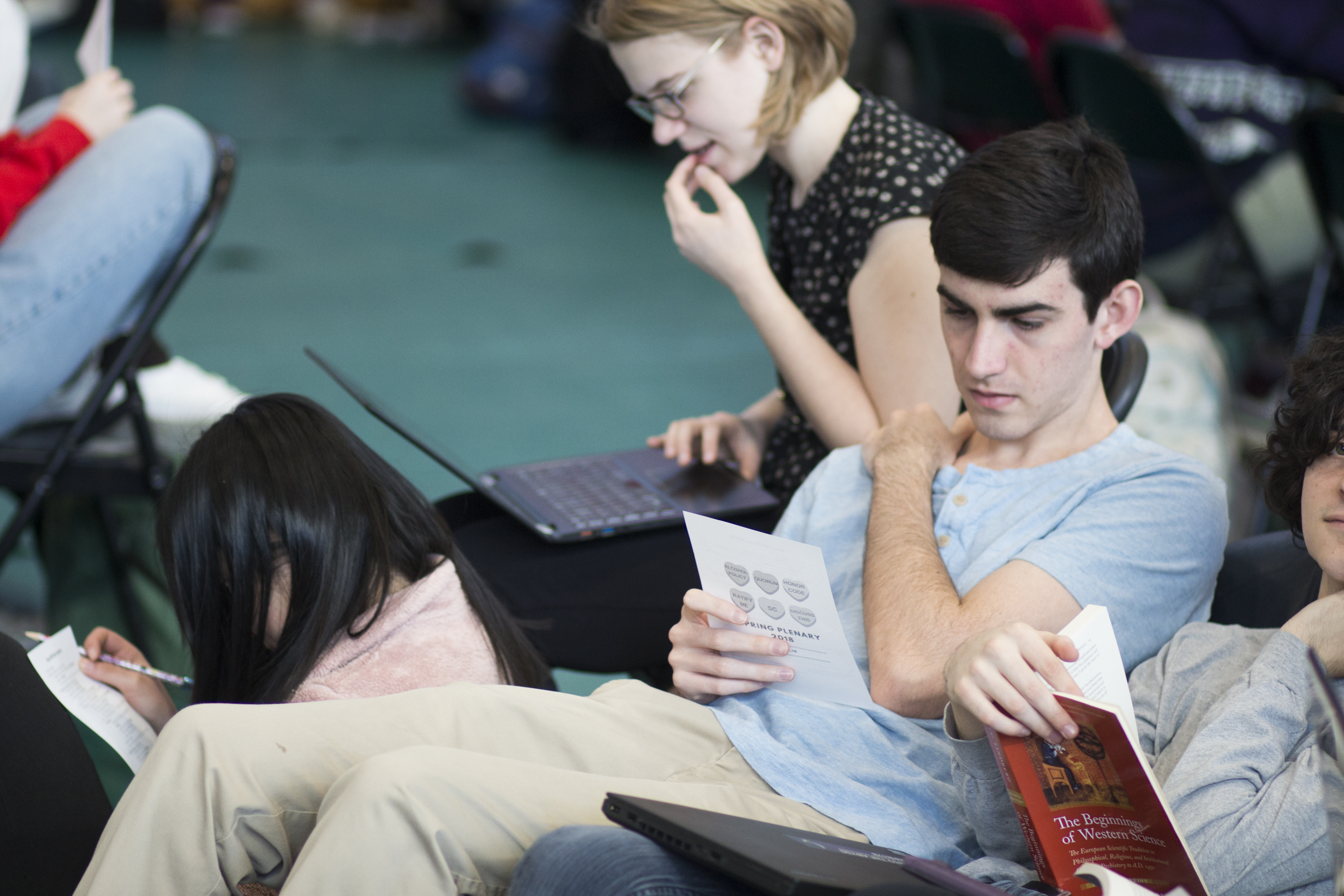By Annarose King and Vanessa Shehu, Staff Writers
In a community-based webinar titled “Mingling Friends to Motivate Action” on November 19, ahead of Georgia’s January runoff election, political activists Monica Rao and Maggie Bishop took time to celebrate the effort put into the 2020 general election. This meeting was intended to provide ideas “to get involved” with the Georgia senate races, especially with organizations in Georgia. “The Georgia election,” Bishop said, is an uncertain measurement of the government’s productivity during the Biden administration, but “grounding ourselves in hope can be really helpful to be motivated.”
Rao and Bishop met during their freshman year at Haverford College, in 2006. Rao has worked for political campaigns since she was a teenager, a commitment that began with a position at Democratic Committee Office in Bucks County, Pennsylvania. She has volunteered for local and state campaigns in Pennsylvania and Michigan, as well as the Kerry and Obama presidential campaigns. She was the Finance Director for Rashida Tlaib’s 2018 congressional campaign, a position that taught her the ins-and-outs of fundraising. Bishop, who lives in California, has a background in elementary education as a school social worker and charter school founder. Her work with underserved youth and immigrant populations also provides an understanding of the heart of the issues facing some of America’s most marginalized communities. Bishop came up with the idea to “bring people together, to become inspired, and to build a forum to make people feel accountable to each other.”
“Mingling Friends to Motivate Action” included five general election forums before November, with an overall total of 230 attendees, including Tri-Co alumni and students. The Georgia forum had 40 participants. Yongjun Heo, a Swarthmore alum, helped Bishop and Rao with their digital marketing design. The five general election meetings focused on mental health, voter registration, mail-in and absentee ballots, impact of multilingual volunteers, and donation information. Bishop and Rao also discussed “promoting the vote” with voter outreach, and “protecting the vote” for an ethical election.
The motive of Mingling Friends to Motivate Action is “how to break the ice of flight, fight, or freeze.” The process of “removing barriers” of voting engagement requires, as Bishop states, using the idea of “name it to tame it” for one’s emotions. As a direct stand against “scary” or “overwhelming” information about voting, Bishop and Rao incorporate logical ways of being involved. They compare educating voters to a kid learning to ride a bicycle, as both “need encouragement” to know they can accomplish their tasks. Rao sees MFTMA as a way to connect with Haverford alumni, especially students who graduated after her. Sometimes, she notes, you can “feel like you’re facing the world alone” with voting, or any governmental process, in the United States. “Usually,” she said, “voting is not that complicated,” and it’s “not fair that it is this year.” By conversing with other people about elections, you can be reminded that “we’re all going through the same thing and breaking down information together.” There is a “magic in bringing people together,” Rao stated, in the midst of helping those people to learn more about voting. “There has always been voting suppression with elections, and understanding how voting works can help overcome that.”
Over the Zoom call, Rao discussed the importance of researching candidates with virtual and written canvassing. For voters in Georgia, a collection of facts “that really stick in their mind” about the candidate and get them to vote is important. Out-of-state volunteers tend to have the mindset that Georgia’s runoff election on January 5, 2021 is “about better representation for our country,” Rao said. With a total of 46 Democratic senators, 50 Republican senators, and two independent senators who generally vote with Democrats, two more Democratic seats would provide a “50/50 split.” Rao mentioned the two Democratic candidates, Jon Ossoff and Reverend Raphael Warnock.
The three main actions covered in the meeting were “voter registration, voter outreach,” and “election protection.” In-state voter registration focused on voters removed from polls, and 23,000 teenagers newly eligible to vote, as well as the “extra step” of more mail-in and absentee ballots. Voter outreach can be in-person or virtual, through the Georgia campaigns, and grassroots organizations, such as New Georgia Project. Voter and election protection rely on in-state poll workers and poll observers; “ballot curing,” or contacting voters with invalidated ballots, can be done out-of-state.
While “explain[ing] the minutiae of early voting” might be monotonous, Rao and Bishop are effective in engaging with participants. Two factors that guide their presentations are “explaining state and county rules” and creating “graphics,” including interactive activities. They also have to consider unexpected situations, such as if there are multiple people in your house who are voting, “and [if] you put your ballot in someone else’s envelope” by mistake. One solution would be “to match the number on your ballot to the number on your envelope.” As “the president [has been] spreading misinformation and doubt about voting,” it has felt that much more necessary to provide accurate information and motivate other people. “Even though you know he’s spouting nonsense,” Rao says, “getting people to vote is so hard.” As “people don’t think their votes matter” in the first place, even more doubt arises when they hear false claims of uncounted ballots, or invalid demands to recalculate Georgia’s votes. In reality, legitimate voter suppression exists in “fake ballot boxes in California” and “an open “ballot box set on fire in Boston” when a lit match was tossed inside.
In an interview, Rao and Bishop discussed how they had become invested in political action, and the significance of engaging people in voting. By April 2008, with presidential campaigns underway, future First Lady Michelle Obama hosted an event at Haverford’s Alumni Field House on the 15th. Two days later, on April 17, Rao and Bishop also went to Hillary Clinton’s talk in Founders Great Hall. At the end of Clinton’s speech, Bishop raised her hand to ask about aid for Hurricane Katrina survivors. Clinton spoke to her after the Q&A, and remembered her name, Bishop recounted, along with two other students who also had questions. Those two events were memorable instances of campaigns appearing at Haverford.
Bishop and Rao also shared more personal memories of how they felt when Obama was elected in November 2008. Bishop was studying abroad in Spain, and remembered how exhilarated she and the rest of the group felt as they had counted ballots for Obama’s election. They were at an overnight lock-in for IES Granada, their study abroad program, and danced in the rain “until the sun came up,” she said. By the photos Bishop drew up to show us, everyone dancing looked as if they couldn’t care less that it was pouring. Rao, who was studying abroad in Paris, was equally thrilled, although feeling the lack of fellow Americans to celebrate with. While walking down the street, Rao saw a French newspaper stand, with front pages announcing that Obama had won. Stunned, yet happy, Rao took in the headlines. A woman walked up to her, asking in English if she could take a photo of Rao for her newspaper, and Rao agreed. The woman, who Rao assumed was an American journalist, snapped a photo, and said that Rao’s expression showed the precise feelings of what had gone wrong in the US that day. Before Rao could correct her, that she was actually delighted that Obama had won, the woman hurried away, into the crowd. For both Bishop and Rao, those memories were the “last time” they felt “passion around politics.”
The 2020 election filled television screens and newsfeeds in a dizzying array of guesswork for three onerous days. Emotions were running as high as predicted voting tallies. An individual’s vote holds the possibility of a joyful surprise after a hard-won campaign, even when viewed through the lens of another person’s politics. There is the possibility of dancing all night, in the rain, until sunrise. The laws of a democracy will be upheld by that vote, and by every vote. Everyone has experienced the emotional stressors of this election as the pressing concerns of rising COVID-19 infections, racism, and police brutality against Black Americans. There is still time to go vote (in Georgia), to be mindful of your emotions as you take action, and to let bravery balance out fear.
Image credit: Financial Times



